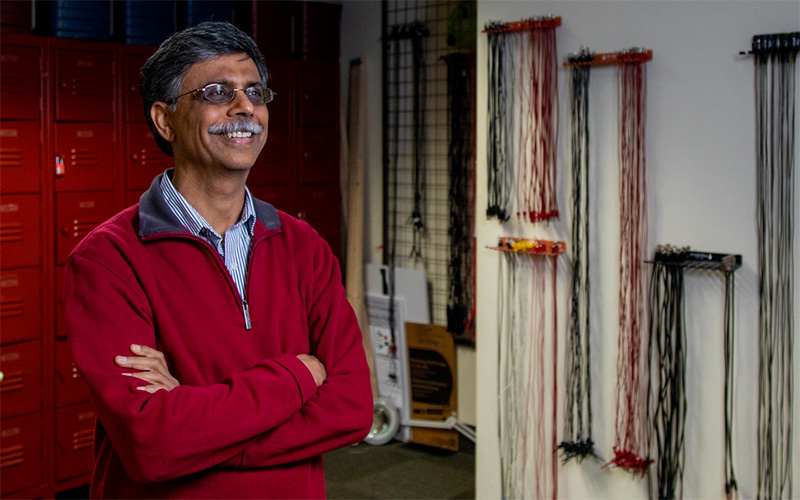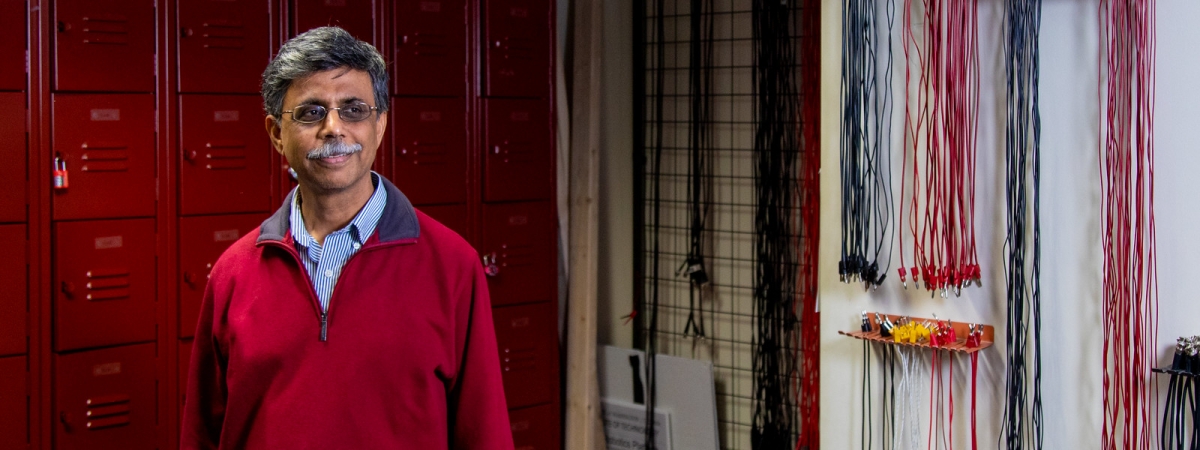
Getting SET for the Future
New initiatives and rapid growth are part of the vision for engineering and technology education at UW Tacoma.
Before he was Dean of UW Tacoma’s School of Engineering and Technology, Rajendra “Raj” Katti worked as a professor at North Dakota State University (NDSU) in Fargo. Among other achievements, Katti helped launch the university’s computer engineering program. “I stayed there for 23 years and wasn’t looking for a job.”
Then one day the phone rang. On the line — a professor from UW Tacoma’s Institute of Technology. “He asked if I was interested in coming to Tacoma and helping run the computer engineering program,” said Katti. “I said ‘no, I’m not interested in coming.’” The faculty member encouraged Katti to visit campus before making any final decisions. “I came here and this place is so beautiful I just couldn’t resist,” said Katti.
Born in India, Katti attended the prestigious Indian Institute of Technology Bombay, where he pursued a degree in mechanical engineering. “You put Stanford, Caltech and MIT together and get you that school,” he said. Katti earned a master’s in mechanical engineering from the University of Idaho in 1985. He followed that up with another master’s and a Ph.D. in computer science and electrical engineering from Washington State University.
Katti could have gone to work in the private sector. “I’m a microprocessor designer and was part of the design team for the first Pentium 4 that came out,” he said. “They [Intel] asked me to stay but I decided working with students made me happier.”
Katti started at UW Tacoma in the fall of 2014. The change in scenery brought with it a different student body. “At North Dakota we had the traditional student,” said Katti. “Here, half of our students are Pell-eligible, they come from families who aren’t well-to-do and more than half of them are first-generation students.”
Katti relished the opportunity to help students create a future for themselves. “I think, here at UW Tacoma, I’ve had the most impact on a student’s life,” he said. “I don’t think I can ask for anything more, that’s all I ever wanted to do and never thought I’d get that opportunity.”
This passion for education and helping students carries over into Katti’s role as dean. Except now, he’s responsible for helping SET grow. “We started out as the Institute of Technology back in 2001 with the goal of providing economic mobility for the citizens of this area while also providing a workforce for industry and spurring economic development in Tacoma,” he said. “We have come a long way but there is still more to do.”
Currently, a high school student who wants to pursue mechanical or civil engineering will have to look elsewhere. Katti wants that to change. “There are roughly 8,000 high school students in Tacoma Public Schools and they have no place to go in the South Sound if they want to pursue engineering,” he said. “The same is true for transfer students from area community colleges.”
Katti helped launch UW Tacoma’s electrical engineering program back in 2017 and is now working to add mechanical and civil engineering to SET’s growing list of majors. “Our proposal has been approved by the state legislature so now we’re focused on getting that up and running,” he said.
The addition of mechanical and civil engineering will help attract students to SET. Katti sees this as a first step. “We want to give our students the opportunity to carry on into graduate school right here, on our campus,” he said. Proposals to add a master’s degree program in electrical and computer engineering and a Ph.D. in computing have received preliminary approval. “Graduate programs strengthen faculty research,” said Katti. “Also, industry wants schools to have a strong research component so this is going to help the economy.”

Katti rattles off some names, including “NASA, NSF and NIH.” The last two refer to the National Science Foundation and the National Institutes of Health. “These are federal agencies that usually fund top schools in the nation and our faculty are receiving grants from them,” he said.
Faculty in SET are conducting cutting-edge research in a variety of fields including cybersecurity, cloud computing, GIS, machine learning and circuitry, just to name a few. “We have faculty who are getting million-dollar grants,” said Katti. “This is a huge deal for anybody in any university and we have it here in Tacoma — it’s mind boggling.”
SET has built strong relationships with companies like Microsoft and Infoblox. This connection is becoming something of a loop. “We have faculty who are working on research projects with these companies,” said Katti. “Students take part in these projects and this experience helps them get internships and even jobs later on.”
SET’s hands-on approach to education is paying dividends for graduates. “We have students who have gone on to work for not only Microsoft and Infoblox but also Google, Amazon, Facebook and Boeing,” said Katti. “We’ve also seen students get accepted into top Ph.D. programs at schools like Georgia Tech, Virginia Tech and the University of Minnesota.”
Government has also taken an interest in SET. “The City of Tacoma is looking for civil engineers but is having difficulty,” said Katti. “We’re discussing ways to partner with the City where we graduate engineers that end up working for them.”
The Navy is also a close collaborator with SET. “The Navy gives us student projects to work on as part of the senior capstone,” said Katti. “Students then fabricate a design and present it to representatives from the Navy.”
The growth at SET also includes a physical component. The Academic Innovation Building (AIB) is currently scheduled to open in the fall of 2023. The AIB will support mechanical engineering program through the creation of additional labs and classrooms. The proposal has already received design funding from the state legislature. When completed, the facility will house parts of SET and the Milgard School of Business. “This is going to be a great partnership,” said Katti. “This will be a place where companies start because you’ve got the technical expertise on our side combined with the understanding on the other end of how to run a business.”
Katti spent more than two decades at North Dakota State University. By comparison, he’s been at UW Tacoma only five years. A lot has happened during that time and Katti hopes that continues. “I really like being on this campus and in this city,” he said. “I can see myself staying here for the next 20 years.”



